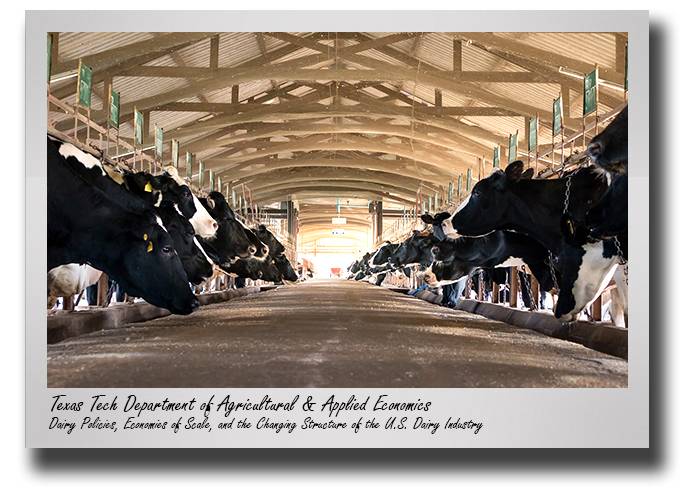AAEC’s Stephen Devadoss to chart U.S. dairy industry’s changing structure
By: Norman Martin
 Examining the impacts of the Farm Bill and insurance programs on the U.S. dairy industry's
economies of scale and dairy farm consolidation, along with the sector's profitability
and foreclosure levels, is the focus of a new near $500,000 USDA grant led by Stephen Devadoss, a nationally-recognized professor from Texas Tech University's Department of Agricultural
and Applied Economics.
Examining the impacts of the Farm Bill and insurance programs on the U.S. dairy industry's
economies of scale and dairy farm consolidation, along with the sector's profitability
and foreclosure levels, is the focus of a new near $500,000 USDA grant led by Stephen Devadoss, a nationally-recognized professor from Texas Tech University's Department of Agricultural
and Applied Economics.
 "The dairy industry is an important part of West Texas agriculture." Devadoss said.
"This project will help us to undertake research to study and find solutions related
to the problems faced by the dairy farmers. Even under normal economic conditions,
small dairy farmers face numerous difficulties.
"The dairy industry is an important part of West Texas agriculture." Devadoss said.
"This project will help us to undertake research to study and find solutions related
to the problems faced by the dairy farmers. Even under normal economic conditions,
small dairy farmers face numerous difficulties.
"With changing structure of the industry and the problems exacerbated by the COVID pandemic, it is important now, more than ever, to work on research to solve dairy farmers' economic challenges," he said. Devadoss notes that the project falls within the realm of his research related to risk management in agriculture under his Emabeth Thompson Endowment Professorship at Texas Tech.
In these tough times, many dairy farmers are having difficulty coping with an onslaught of financial losses arising from structural changes due to low milk prices, high feed costs, consolidation, economies of scale, and demand fluctuations for milk products.
The grant, titled "Dairy Policies, Economies of Scale, and the Changing Structure of the U.S. Dairy Industry," is supported by the USDA's Agriculture and Food Research Initiative Foundational Program. It will run for the next four years, and be directed by Devadoss and Jeff Luckstead, an associate professor of agricultural economics at Washington State University.
Today, U.S dairy policies such as Dairy Margin Coverage aim to manage risk by insuring against market margin (the difference between average milk price and feed costs) fluctuations. The 2018 Farm Bill authorized the Dairy Margin Coverage program, which is a voluntary risk management program for dairy producers.
Meanwhile, there's the Dairy Revenue Protection insurance policy that mitigates risk faced by the dairy farmers. It is designed to insure against unexpected declines in the quarterly revenue from milk sales relative to a guaranteed coverage level.
Looking ahead, Devadoss and Luckstead plan to develop a theoretical model of risk-averse dairy farms that are heterogeneous in size to study the implications of dairy policies, structural transformation toward larger farms, and dairy survivability. They'll also econometrically estimate the multivariate distributions of regional and national milk prices, feed price index, productivity distribution, cost function, economies of scale, and heterogeneous dairy model.
In addition, the research team is set to analyze the effects of Dairy Margin Coverage and Dairy Revenue Protection on optimal input use, production, economies of scale, survivability of dairies, coverage level, coverage percentage, and program payments, as well as examine the basis risk and regional effects of Dairy Margin Coverage and Dairy Revenue Protection and provide policy recommendations.
CONTACT: Stephen Devadoss, Professor and Emabeth Thompson Endowed Professor, Department of Agricultural and Applied Economics, Texas Tech University at (806) 834-6260 or stephen.devadoss@ttu.edu
0104NM21
Davis College NewsCenter
-
Address
P.O. Box 42123, Lubbock, Texas 79409-2123, Dean's Office Location:Goddard Building, Room 108 -
Phone
(806)742-2808 -
Email
kris.allen@ttu.edu
